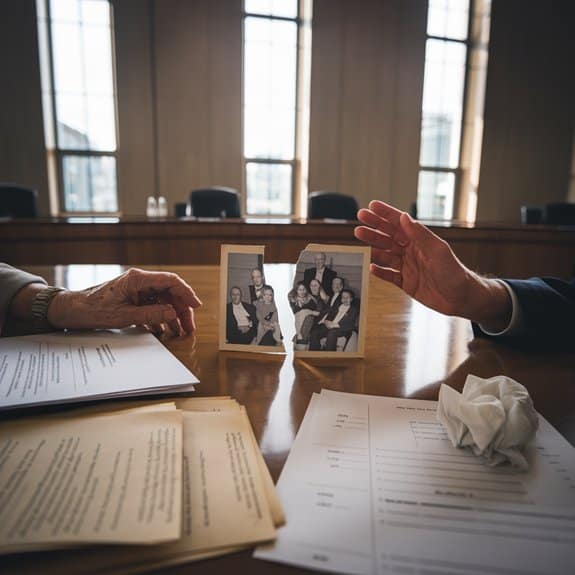
In BC, estate litigation typically arises from five main causes: lack of testamentary capacity, undue influence on the testator, will variation claims by family members under WESA, improper document execution, and executor misconduct. You will also encounter disputes over intestacy, financial elder abuse, and challenges to lifetime property transfers. Understanding these common triggers can help you anticipate potential conflicts and take preventative steps through proper estate planning with qualified legal guidance.
Lack of Testamentary Capacity
When a will is challenged due to lack of testamentary capacity, the court examines whether the testator possessed the mental ability to understand their actions when creating the document.
To successfully contest a will on these grounds, you will need to demonstrate that the deceased did not comprehend the nature of making a will, the extent of their property, or who should reasonably receive their assets.
Evidence often includes medical records documenting cognitive decline, witness testimony from those present during the will’s creation, and expert opinions from healthcare professionals.
The court will consider whether the testator had lucid intervals even if they suffered from conditions like dementia.
BC courts apply the principle established in Banks v. Goodfellow, which remains the standard for determining whether someone had sufficient capacity when they prepared their will.
Undue Influence Over the Testator
Unlike lack of testamentary capacity, undue influence focuses on external pressure rather than mental ability. You may need to challenge a will if someone exerted pressure on the will-maker, causing them to make decisions they would not have made freely. This involves someone manipulating or coercing the testator for personal gain.
When investigating undue influence, courts examine the relationship between the will-maker and the alleged influencer. Key evidence includes isolation of the testator, sudden changes to the will, or unusually large bequests to non-family members.
The timing of will changes, especially when made during illness or vulnerability, can also indicate undue influence. BC law requires substantial evidence to prove that the testator’s free will was overborne by another person’s actions.
Will Variation Claims by Spouses and Children
British Columbia’s Wills, Estates and Succession Act provides a unique legal remedy that allows certain family members to challenge a will even if it is perfectly valid.
Under this legislation, spouses and children (including adult children) can apply to the court if they believe they have not received adequate provision from the estate.
When evaluating these claims, courts consider factors such as the relationship between the deceased and the claimant, any legal or moral obligations, the size of the estate, and the claimant’s financial needs.
You should know that a successful variation claim can result in a court-ordered redistribution of assets, potentially increasing your inheritance or providing you with a share when you were excluded entirely.
These applications must be filed within 180 days after the grant of probate.
Improper Execution of Will Documents
A will must strictly adhere to legal formalities to be considered valid, regardless of how clear the testator’s intentions might’ve been.
In BC, the Wills, Estates and Succession Act outlines specific requirements for proper execution: the document must be in writing, signed by the testator, and witnessed by two adults who are not beneficiaries.
If these formalities are not followed, the entire will may be declared invalid. Common execution errors include having only one witness, using interested witnesses (beneficiaries), or failing to have all parties present during the signing.
Without proper execution, your estate may be distributed according to intestacy rules rather than your wishes. Courts rarely overlook these technical requirements, so it it essential to guarantee your will meets all legal formalities when executing estate planning documents.
Executor Misconduct and Breach of Fiduciary Duty
Executors who mishandle estate assets or fail to act in beneficiaries’ best interests commit one of the most serious breaches in estate administration.
When appointed as executor, you take on significant legal responsibilities, including prudent management of assets, fair distribution according to the will, and transparent accounting of all transactions.
Common forms of executor misconduct include self-dealing (using estate assets for personal benefit), unnecessary delays in distribution, favouritism toward certain beneficiaries, or failure to properly account for estate funds.
If you are a beneficiary who suspects misconduct, you can petition the court to review the executor’s actions, request detailed financial records, or even seek the executor’s removal.
Courts take these matters seriously, often ordering compensation for losses and, in egregious cases, imposing personal liability on the executor.
Disputes Between Beneficiaries Over Asset Distribution
Even with the clearest wills and estate plans, tensions between beneficiaries over property distribution can quickly escalate into full-fledged legal disputes.
These conflicts typically arise when beneficiaries disagree about the interpretation of will provisions or the valuation of specific assets. Personal items with sentimental value often become focal points for heated disagreements, even when their monetary worth is minimal.
Family treasure or garage sale item? Estate disputes often hinge on sentimental value, not dollar signs.
You might encounter situations where siblings battle over family heirlooms or where stepfamilies clash over the division of assets.
These disputes frequently stem from underlying family dynamics and historical grievances rather than the assets themselves.
In BC, courts may intervene to interpret ambiguous will provisions or, in cases involving executor-beneficiaries, to guarantee fair distribution when conflicts of interest arise.
Resulting Trust Claims in Parent-Child Property Transfers
When parents transfer property to their adult children in British Columbia, the law presumes this is not a gift but rather a resulting trust. This means the child is legally considered to be holding the property for the parent’s benefit unless evidence proves otherwise.
This presumption often leads to litigation after a parent’s death when other beneficiaries challenge property transfers.
To rebut this presumption, you will need clear evidence of the parent’s intention to make a gift. This can include written statements, consistent testimony from witnesses, or documentation showing the parent’s desire to permanently transfer ownership.
Courts carefully examine the circumstances surrounding the transfer, including the parent’s mental capacity and whether any undue influence existed at the time of the transaction.
Intestacy Disputes When No Valid Will Exists
If a person dies without creating a valid will in British Columbia, their estate becomes subject to intestacy rules, which can spark significant family disputes over asset distribution.
Intestacy rules in B.C. often create a breeding ground for family conflict when assets must be distributed without testamentary guidance.
These provincial laws dictate how property passes to surviving relatives, often in ways the deceased might not have intended.
You will find that intestacy disputes commonly arise when family members disagree about who should administer the estate or how assets should be divided.
Blended families face particularly complex situations, as stepchildren may not inherit under intestacy rules.
Additionally, common-law partners may have fewer rights than legally married spouses, requiring them to make specific claims against the estate.
Without a will’s clear direction, relationships between surviving family members can quickly deteriorate as they navigate these challenging circumstances.
Elder Financial Abuse in Estate Planning
Elder financial abuse represents one of the most disturbing forms of exploitation in estate planning, particularly because it targets vulnerable seniors who may have diminished capacity to protect themselves.
In BC, this abuse often manifests when someone in a position of trust manipulates a senior into changing their will or transferring assets. If you suspect financial abuse has occurred, you can challenge estate documents based on undue influence or lack of capacity.
- Perpetrators are often family members, caregivers, or others with close access to the senior.
- Warning signs include unexpected changes to wills, power of legal representative documents, or unusual financial transactions.
- Courts take these cases seriously and may invalidate documents created under exploitative circumstances.
Challenges to Inter Vivos Gifts and Property Transfers
Inter vivos gifts and property transfers, made while a person is still alive, frequently become subjects of heated estate litigation in British Columbia.
These disputes often center around the validity of the transfer, with challenges based on the presumption of resulting trust, which applies when a parent transfers property to an adult child without clear documentation of intent.
When parents transfer assets to adult children without clear intent documentation, a presumption of resulting trust arises, frequently triggering estate disputes.
You will need strong evidence to defend or contest such transfers.
Common challenges include claims of undue influence, lack of capacity at the time of transfer, or allegations that the transfer was actually intended as a loan or trust arrangement.
Courts examine factors like the relationship between parties, documentation of the transfer, and whether the gift-giver understood the consequences of their actions when determining validity.
How Vest Estate Law Can Help
When maneuvering the complex terrain of estate disputes, Vest Estate Law offers specialized expertise to protect your interests and achieve favourable resolutions.
As a boutique firm dedicated exclusively to wills and estates law across BC and Alberta, our focused practice guarantees you are working with lawyers who truly understand the nuances of estate litigation.
- We will answer your questions about will challenges, capacity issues, and undue influence claims.
- We will guide you through estate administration processes when conflicts arise.
- We will represent your interests whether you are an executor facing challenges or a beneficiary seeking fair treatment.
If “push comes to shove” in estate matters, you need representation from a firm that concentrates solely on this specialized area of law.
Vest Estate Law provides the experienced advocacy you need during these difficult legal proceedings.
Frequently Asked Questions
How Long Does Estate Litigation Typically Take in British Columbia?
Estate litigation in BC typically takes 1-3 years depending on complexity, court schedules, and whether you are able to settle through mediation rather than proceeding to trial.
What Are the Costs Associated With Contesting a Will?
You will face legal fees of $15,000-$50,000+ when contesting a will, depending on complexity, hourly rates, and whether it settles or proceeds to trial. Court costs apply too.
Can a No-Contest Clause Prevent Beneficiaries From Challenging a Will?
A no-contest clause can discourage challenges but is not always enforceable in BC. You will still have rights to contest a will on grounds like undue influence or lack of capacity.
Are Handwritten Changes to a Formal Will Legally Binding?
Handwritten changes to a formal will generally are not legally binding in BC. You will need to properly execute these alterations with witnesses for them to be valid under the Wills, Estates and Succession Act.
How Does the Concept of “Suspicious Circumstances” Affect Will Challenges?
Suspicious circumstances shift the burden of proof in will challenges. When identified, you will need to prove the will’s validity rather than challengers proving its invalidity. Courts scrutinize these cases carefully.

We serve the entire province of BC. Our experienced paralegals can meet with you in Vancouver and throughout the Lower Mainland, making it easier for you to get the assistance that you need. We also have an interior office in Kamloops. That said, our lawyers have the infrastructure to work with any of our clients virtually — even in the furthest regions of British Columbia.
Call (604) 256-7152 [toll free 1 (877) 415-1484] to get routed to the best representative to serve you or contact us online to schedule an appointment.
We also have a dedicated intake form to help you get the ball rolling. Our intake team will review your specific case and advise you on the next steps to take and what to expect moving forward.
Our offices are generally open 8:30 a.m.—5:00 p.m., Mon—Fri.
Vest Estate Law is dedicated to providing you with practical and innovative advice in estate administration, estate planning, and estate disputes, do not hesitate to reach out and one of our knowledgeable staff will respond promptly to arrange a consultation that meets your needs.


Kelly Sullivan
WILLS and ESTATES PARALEGAL
Kelly is a highly accomplished Paralegal with an impressive 28-year tenure in the legal industry, specializing in estate administration and estate planning at Vest Estate Law.

